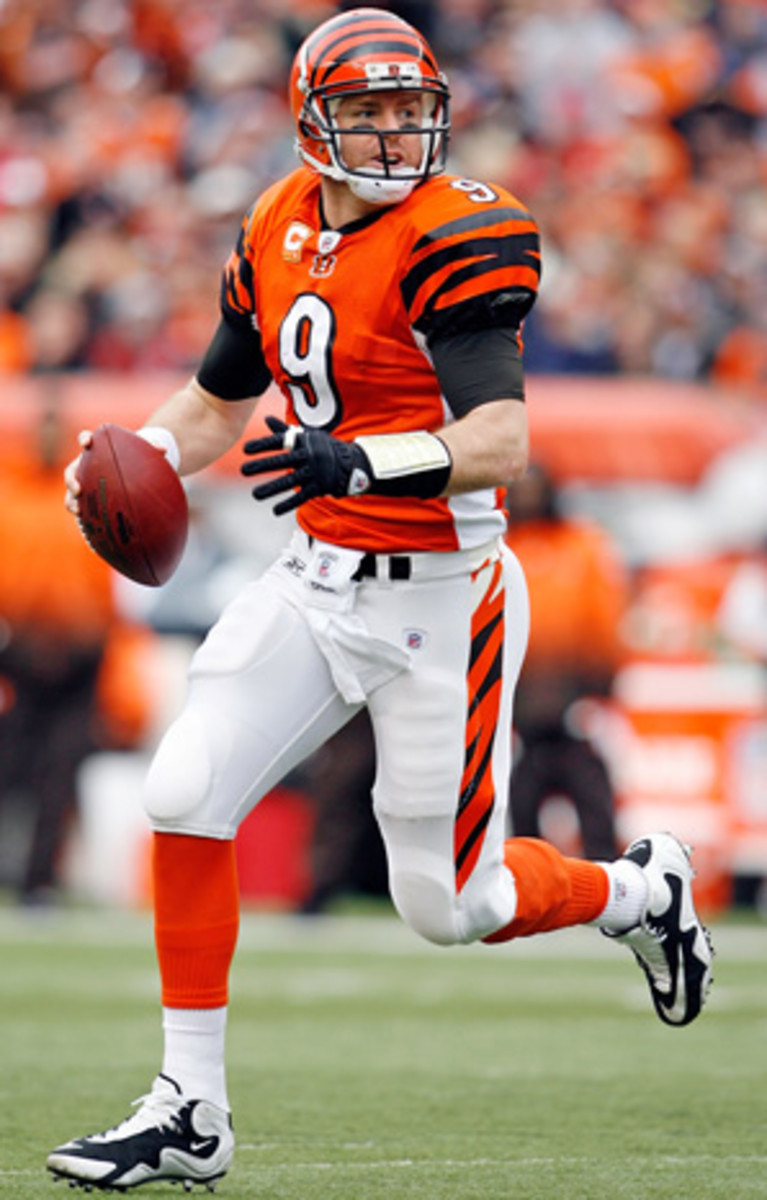
The Cincinnati Bengals are on the clock ... and don't need much
The Cincinnati Bengals are solid.
Let me repeat that just to make sure my fingers tapped the right keys. Heading into Thursday night's opening round of the NFL's three-day, primetime draft-a-palooza, the Cincinnati Bengals are solid. So solid that, sitting at No. 21, they can file their nails and take in a movie while the teams ahead of them scheme and dream their way through the first few hours.
The Bengals' biggest need is a tight end who can catch passes. They need a tall target who can take a hit and hold onto the ball across the middle on third-and-8. That's about it. That's like a baseball team that lists a good middle reliever as its biggest need.
Sure, Cincinnati would like other players. A safety would be nice, given both its starters, Chris Crocker and Roy Williams, are 30 years old. The Bengals would also like a cornerback they can groom to replace either Johnathan Joseph or Leon Hall, both of whom are on the edge of stardom and will be free agents in 2011 and 2012, respectively.
They'd like a guard who can learn from the wise veteran Bobbie Williams. Beyond that, the Bengals are in their recliners and lighting a good cigar.
How can this be?
For a very long time, "The Cincinnati Bengals are on the clock'' was every bit as funny as "two guys walk into a bar ... '' The Cincinnati draft experience in the 1990s -- commonly referred to locally as The Lost Decade -- can be summed up by remembering the stricken look that came across the face of quarterback David Klingler the instant he realized he'd been picked No. 5 overall by the Bengals in 1992. It was as if a truck had backed over Klingler's dog.
Klingler's look was telling. In four seasons and 24 starts in Cincinnati, he threw for 16 touchdowns, had 21 picks and a quarterback rating of 66.1. He took more hits than Obama's health plan. Klingler enjoyed his time in Cincinnati so much, he took to eating his lunch in his truck. But compared to Cincinnati's next top quarterback pick, David Klingler was Johnny Unitas.
That would be Akili Smith, draft class of '99. Smith's awesome NFL career lasted four years, all in Cincinnati, where he started 17 games, threw five touchdown passes and 13 interceptions and sported a dazzling quarterback rating of 52.8.
Here are some other great names in Bengals draft history: locate them now, win fabulous prizes! Reinard Wilson, Peter Warrick, Big Daddy Wilkinson, KiJana Carter and John Copeland were all first-rounders taken between 1993 and 2000. Second-round finds during that era included Tony McGee, Marco Battaglia, Artrell Hawkins, Mark Roman and Charles Fisher.
If you're searching for them maybe start with milk cartons.
When the Bengals were reverse-dominating the NFL in the 90s, they operated in much the same fashion as they do now. Their mom-and-pop personnel department includes the brother of president Mike Brown and Mike Brown's son. They don't have a general manager, unless you count Mike Brown, who has paid himself a few million dollars over the years for mishandling that job.
The Bengals' media guide lists one scout, Greg Seamon. Actually, they have four people who cover the country, 50 schools apiece. They belong to a league-wide scouting service. Over the years, Brown has even enlisted the wisdom of a local man named Jerry Jones. Jones is a retired pharmacist. He follows potential draftees as a hobby. He puts together a pre-draft book that he calls The Drugstore List. Brown has valued his opinion.
Brown defends his style by saying the Bengals get as much pre-draft information as any other team. That was fine, as far as it went. How the Bengals interpreted that information was always the catch.
Not so much now.
Things began to change when the Bengals hired Marvin Lewis in 2003. Lewis represented two things: A wise NFL vet, whose years with the Steelers, Ravens and Redskins allowed him to build deep ties and friendships with players and coaches around the league, and a break from the Bengals' preference for in-house coaches to do Mike Brown's bidding. Dave Shula, Bruce Coslet and Dick LeBeau were house guys who went along to get along.
Lewis hired Mike Zimmer two years ago to coach the defense. Zimmer was respected by the players he'd coached in Dallas and Atlanta and has a good reputation league-wide. What that has meant for the Bengals is the occasional outside-the-family thought. Without a pro personnel department, Lewis and Zimmer have brought in solid veterans to build a quality defense: Dhani Jones, Williams, Tank Johnson, Antwan Odom.
When they needed a running back, they took a chance on Cedric Benson, who was unemployed and reputation-challenged.
In the meantime, the four-man miniature scouting department has been together seven years, building contacts and goodwill on college campuses around the country. They've had some painful misses in recent years -- wideout Jerome Simpson, a No. 2 in 2008, can't get on the field -- but overall have done well.
Last season, six of Cincinnati's top eight draft picks played significant roles on a team that won a division title. Over the past three years the Bengals have picked 29 players of which four are starters and 11 are backups. Compare that to the New England Patriots, the gold standard for personnel wisdom, during that same stretch: Twenty-eight picks, four starters, eight backups.
What the Bengals are doing could be an aberration, given their business practices aren't much different from The Lost Decade. That won't matter much Thursday, Friday and Saturday. What they've done lately has worked remarkably well.
A pass-catching tight end is all they need. The Bengals are on the clock. No joke.





